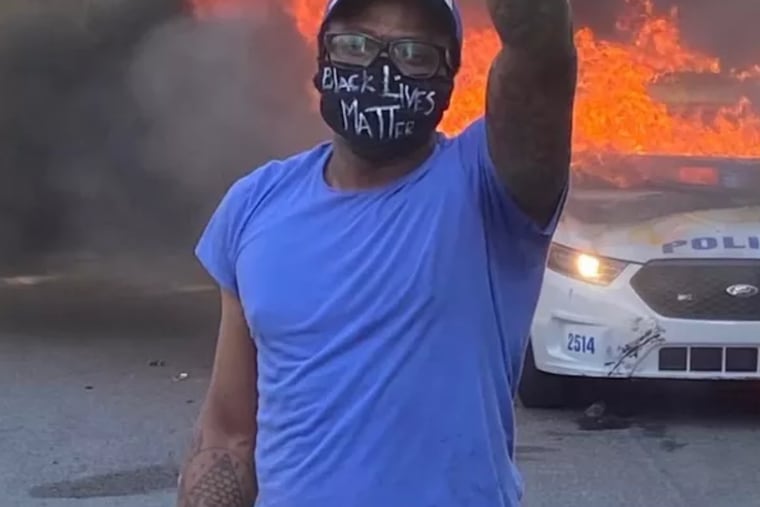Philly man agrees to spend up to 6 years in prison for gun offenses, torching cop car during racial justice protests
Khalif Miller, 27, is the fifth defendant to admit to setting police cars ablaze during the May 2020 protests that erupted outside City Hall after the police killing of George Floyd.

A Southwest Philadelphia man who previously described himself as a “political prisoner” pleaded guilty Tuesday to charges stemming from his involvement in the torching of a police car outside City Hall during racial justice protests after the murder of George Floyd.
Khalif Miller, 27, is the latest defendant accused in the aftermath of the May 2020 demonstrations to cut a deal with prosecutors to avoid a federal arson charge — and the seven-year mandatory minimum sentence it carries.
Instead, like the others, he pleaded guilty to one count of obstructing law enforcement during a civil disorder, with a maximum sentence of five years.
Miller also pleaded guilty Tuesday to one count of illegal gun possession tied to a cache of weapons federal agents found while searching his home during his 2020 arrest.
As part of his deal with prosecutors, Miller agreed to serve a prison term ranging between roughly four and six years as punishment for both crimes — a substantially stiffer sentence than those handed down so far to others charged with torching police cars during the demonstrations.
The two defendants sentenced to date — Ayoub Tabri, 25, of Arlington, Va., and Lore-Elisabeth Blumenthal, 35, of Jenkintown — have received punishments of 364 days and 2½ years, respectively.
“Whose idea was it for you to plead guilty?” Chief U.S. District Judge Juan R. Sánchez asked Miller during his brief hearing in federal court Tuesday.
Sitting next to his attorney, Miller, clad in glasses and an orange prison jumpsuit, replied: “It’s in our best interest, I guess. … My idea.”
His subdued demeanor in court stood in stark contrast to the bitterness he conveyed in an open letter he wrote in August from federal custody, where he has been held since his arrest.
In it, he accused former U.S. Attorney Bill McSwain of using the case against him and two codefendants to score points in the former prosecutor’s failed gubernatorial campaign during this spring’s GOP primary.
“It’s one of his main selling points in his political race for governor,” Miller wrote. “While the world cried out and came together begging for change, he used his powers to criminalize and quell dissent.”
The U.S. Attorney’s Office has been careful in official communications to distinguish between the thousands of demonstrators who flooded Philadelphia streets in May 2020 to protest Floyd’s murder peacefully and those, like Miller, whom they have since charged with arson.
But on his personal social media accounts, McSwain at times appeared to taunt supporters of those he had charged.
After Blumenthal was ordered held without bail in June 2020, he tweeted: “For any of you out there who might have contributed to her bail fund, you can now ask for your money back.”
On the campaign trail, McSwain touted her arrest and those of five others, including Miller, for similar crimes and contended that his office had “literally stopped those riots because word got out that McSwain and the feds were charging people.”
In his open letter this summer, Miller likened the case against him to the “Central Park Five,” referring to the 1989 New York case in which five teenagers of color were wrongfully convicted of raping a white jogger based on racial profiling and discrimination.
Dubbing himself and his two codefendants the “Philadelphia Three,” Miller maintained that he and the others — Carlos Matchett, 32, of Atlantic City, and prominent West Philadelphia activist and teacher Anthony “Ant” Smith, 31 — had not, as prosecutors alleged, conspired together to torch a police car that day and, in fact, had never met.
Instead, he said, he’d merely been taking selfies atop the already overturned police car that was firebombed by someone else and set ablaze.
But prosecutors, in the court filings, told a different story. Surveillance footage showed Miller throwing “flammable paper [or] cardboard into the car” after someone had set it ablaze with a lit road flare.
The combination of the burning car and the combustible material Miller added to the blaze, they said, endangered the lives of hundreds of peaceful demonstrators standing nearby.
They cited the guns and ammunition later found in his home — including shotguns, hollow-point bullets, and a handgun with a laser site, all of which he was prohibited from owning because of previous felony convictions for involuntary manslaughter and assault — as evidence that Miller should be jailed while he awaited trial.
Miller’s plea leaves only one arson case stemming from the May 2020 demonstrations unresolved — that against his codefendant Smith. All other defendants have pleaded guilty or are scheduled to do so in the coming weeks.
Like Miller, Smith is accused by prosecutors not of initially setting the car ablaze but of throwing paper into an already burning car.
He is scheduled for trial in January.